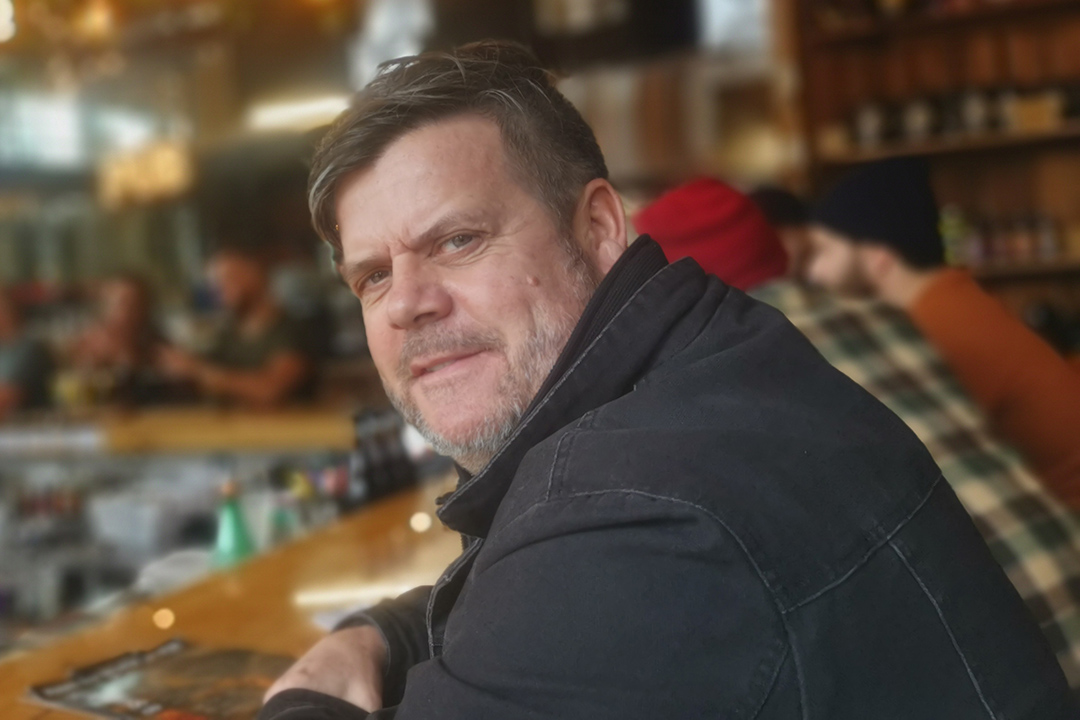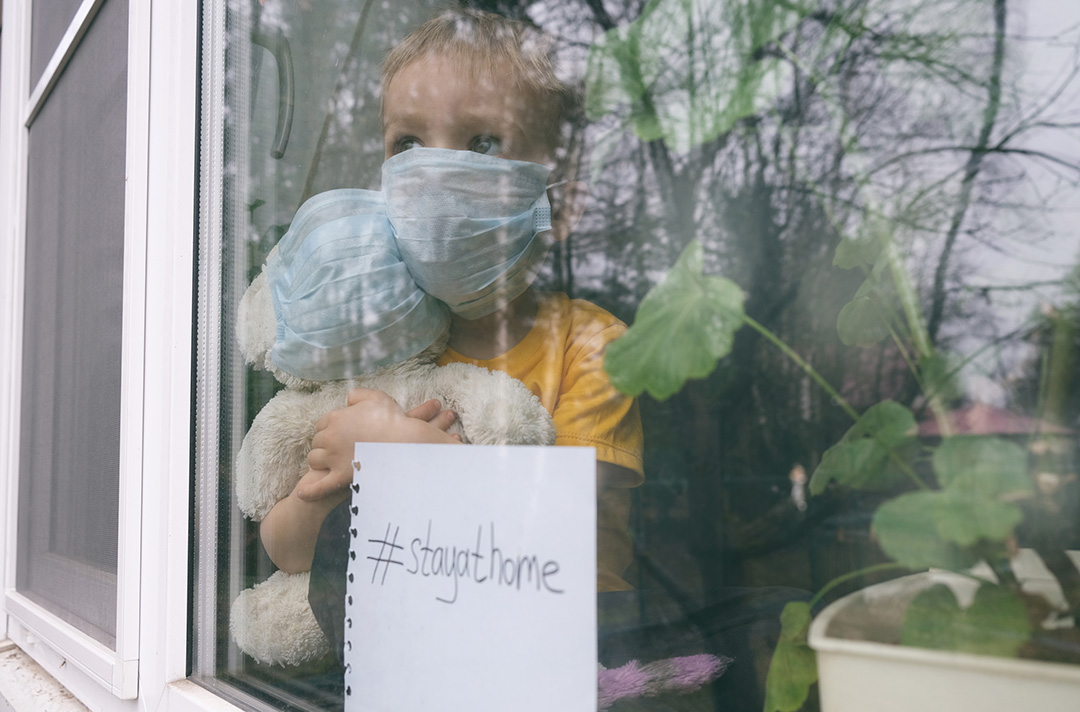
USask unites: Alumnus sought-after expert during COVID-19 pandemic
Since the first cases of COVID-19 were announced in the province, members of the USask community have come together to support one another in these uncertain times.
By Shannon BoklaschukExtraordinary circumstances have brought out extraordinary responses from members of our USask community. From frontline health-care workers to researchers looking for a solution to this global health threat, there are so many stories about people are working to make our home communities safer and healthy. Here are a few of the inspiring stories of our students, staff, faculty and alumni.
A University of Saskatchewan (USask) alumnus is using the expertise he developed during his graduate studies to help educate people around the world about the devastating impacts of coronaviruses.
Miles Fahlman (BSc’90, BA’14, MA’19), a three-time graduate from USask’s College of Arts and Science, spent five years researching SARS (Severe Acute Respiratory Syndrome) for his master’s degree thesis in the Department of Archaeology and Anthropology.
He is now applying the specialized knowledge he acquired about coronaviruses to the current COVID-19 pandemic, and has become a sought-after expert for media outlets seeking context for news stories.
“I’ve worked with several of the national networks in Canada—CTV and CBC— providing unique background information linking the 2003 and the 2020 outbreaks. I also did various interviews for both networks, as well as communications with NPR in the U.S.,” said Fahlman.
“I have been working with media and faculty from several Swiss, Italian and French universities to develop systems and social profiles to better equip society to fight back. We meet online each day trying to develop phone applications to profile public health and disease spread to better inform government and society. Hopefully we can create navigable social contours to allow us get the economy going again.
“I felt I had at least some of the important information to contribute to public health. I had excellent training from the health sciences, epidemiology and medical anthropology (professors) at USask,” he added.
Fahlman is currently one of more than 1,000 people who has signed up to participate in an online hackathon known as Versus Virus, which is supported by the Swiss government. The aim of the initiative is to find digital solutions to some of the problems created by the COVID-19 pandemic.
Fahlman, who has published an article about navigating the “social countours” of SARS-CoV and COVID-19, said on April 6 that his team’s proposal was selected from a total of 263 projects to move on to the next stage of the competition.
“We will now pitch it with 42 others for a 250,000 Euro research award,” he said. “In theory, we could reignite the economy and communities by defining safe areas to reenter and maintain our distance to break the chain of transmission. In other words, if we follow these safe zones—or social contours—of disease for six months to a year, we could get back to our pre-pandemic lives.”
SARS coronavirus (SARS-CoV) was identified in 2003 after first infecting humans in the Guangdong province in southern China in 2002. The SARS epidemic affected 26 countries around the world and resulted in more than 8,000 cases in 2003, according to the World Health Organization (WHO).
“One of the most important things about (these coronaviruses) is that they mutated, from causing disease in animals to causing an atypical and aggressive pneumonia in humans,” Fahlman said.
“This zoonotic animal origin means they are tough to solve from a biomedical standpoint in the human system. (At USask) I learned how important the social response to infectious disease is, (as well as) public health policy and the biopolitics of government. These facets feed together to aid in infectious disease response when there is no cure.”

On March 11, 2020, the WHO declared the global outbreak of COVID-19 a pandemic. Like SARS-CoV, COVID-19 is a coronavirus that causes respiratory symptoms in humans and can lead to death.
Nearly 1.3 million cases have been reported worldwide since COVID-19 first originated in Wuhan, China, resulting in more than 70,000 deaths.
Fahlman said SARS and COVID-19 are “remarkably similar diseases,” but they do have some differences.
“One important difference is SARS-CoV in 2003 spread mostly after latency and incubation. So it was infectious primarily in the symptomatic period. The sample size is small from 2003, so that is mostly what is known,” he said.
“But it appears that the infectious period of SARS-CoV2 (COVID-19) in 2020 lags into the asymptomatic period, so people are spreading it before they show symptoms. This is why it is incredibly important to work from home and shelter in place. Mitigation and containment must happen now with social actions, to give our health-care professionals and teams at USask time to develop a vaccine. In the meantime, we have to learn to listen to our public health officials; they are very good at their jobs.”
When the SARS epidemic emerged in 2003, Fahlman was living in Hanoi, Vietnam. While there, he saw firsthand how a rapid response saves lives, with the government of Vietnam acting fast toward containment. In contrast, officials in China at first had difficulty understanding COVID-19, resulting in a delayed response to the quick-moving virus, said Fahlman.
He then watched closely as COVID-19 infections increased in Hubei province and the city of Wuhan, growing exponentially into the thousands earlier this year.
“They began reporting untraceable community spread, a red flag in the world of epidemiology from a variety of perspectives,” said Fahlman, who now lives in Saskatoon.
“From my training and research, I knew they had lost control. That was about January 23, 2020. I understand how dangerous coronaviruses are when they mutate; the human system does not recognize the disease and has difficulty formulating a response in the typical way to fight back. So I have been prepared since then and told my family, friends and neighbours to get prepared. By that time, I was in communication with doctors, epidemiologists and virologists all over the world on Twitter, and we were comparing notes on all aspects of the outbreak and comparing perspectives.”
As the COVID-19 situation worsened, Fahlman continued to research public health and hygiene protocols—including pandemic preparedness for the home. Well in advance of the current advice to stay at home and to practice physical distancing, Fahlman bought canned goods and water for his household to last for several months. He did this in successive trips in order to not overload the supply chain or hoard products.
“There is still no vaccine for SARS-CoV from the outbreak in 2003. This means we need a social response to these types of outbreaks. It is so important now to maintain physical distance from each other, and respect the social contours—like a social vaccine—to break the chain of transmission of the current SARS-CoV2, which causes COVID-19,” he said.
“In 2003, the outbreak response was incredibly rapid under a well-led communist government lockdown. But as you can see with the current outbreak it is incredibly protracted. The initial response in Wuhan was delayed, bringing the world economy to a halt. It really shows how important rapid response is—a template for future responses.”
Fahlman, a proud USask alumnus, credits much of his academic success to the mentorship he received from faculty members in the Department of Archaeology and Anthropology. This includes Dr. Pamela Downe (PhD), Dr. James B. Waldram (PhD) and Dr. Alexander Ervin (PhD).
“As a mature student, their guidance and support meant so much to me, and the thesis they advised me to write has received a lot of attention online,” Fahlman said. “About 40,000 pages have been read from 170 universities and over 2,000 cities around the world. That may sound overly proud, but (it really is) a testament to my advisors and their mentorship. I had the ideas, but I could have never articulated that thesis alone.”
One thing that stood out to Fahlman during his master’s degree studies was the dangers posed to humans by mutated animal viruses. These mutated viruses force societies to “have to learn as we go and develop medical treatment on the run,” he said.
“Without early containment, as happened with SARS in 2003, we now have to deal with the rapid spread of this new disease,” he said.
Fahlman said he was “extremely relieved” when the Saskatchewan government declared a state of emergency due to the COVID-19 pandemic on March 18, 2020. He sees that “as the exact and correct response to save lives.”
“One important thing, in my view, is that the people of Saskatchewan have gotten off the streets for the most part and have been much more disciplined than other parts of the world,” he said.
“Our history is rich with our major contributions to health care in Canada and around the world. Public health care in Saskatchewan ties back to the farming communities, where families shared farm machinery and thrashers and everyone helped to get the harvest in. Health care grew directly out of this with our former premier Tommy Douglas. This province has an indelible history of sharing resources and working together. We need to flatten the curve of infections and help each other again. Stay indoors and stay safe, and it will be over soon.”

Share your stories with us: We are collecting the stories of resilience and good spirit from our USask community. Please send story ideas and photos to news@usask.ca.
As a community, it is critical that we support each other and remain respectful during what is a difficult time for all of us. Please follow all guidelines and take all precautions to prevent the further spread of COVID-19 in our community.
How you can help our students during the COVID-19 pandemic: https://alumni.usask.ca/news/2020/covid-19-how-you-can-help-our-students.php
For the latest developments and information about the University of Saskatchewan's response to COVID-19, please go to www.usask.ca/updates.
The University of Saskatchewan is undertaking critical research and contributing to global efforts to combat COVID-19. The University of Saskatchewan's Vaccine and Infectious Disease Organization (VIDO-InterVac) is a world leader in developing vaccines and technologies to combat infectious diseases. Your support of the COVID-19 Research Fund supports the increased efforts of researchers at the University of Saskatchewan to develop vaccines and treatments for COVID-19. Donate now.

